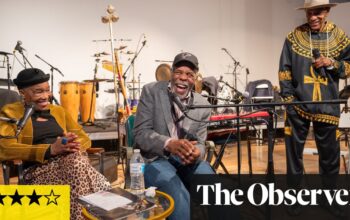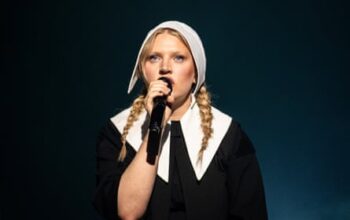There are people who could spend all day arguing about Britpop: what it was, what it is, who invented it, when it started and ended, which bands are Britpop and which aren’t. These people are journalists. Specifically, music journalists, who possess the pedantic instinct of all journalists to get the facts right, but also, because they write about pop music, have a competing desire to be romantic. To mythologise. To make people and events and songs and whole entire years seem more flamboyant, more life-changing and revolutionary than they actually were.
The people who don’t argue about it are the fans and the musicians. The fans, if they’re of a certain age, remember a time when they felt like they were flying, when music meant everything to them because they were young and full of yearning and hope, and the songs were made by people who were young and hopeful and yearning too. Younger fans, if they’re interested, tap into this without thinking about it. They just love the fantastic songs and, sometimes, how the bands looked at their peak.
The musicians don’t argue about Britpop because they refuse to acknowledge it ever existed. Or at least, they refuse to acknowledge that they were part of it. No musician – no artist, really – ever wants to be lumped into a larger group of other bands whose music they might not like, or who they’re a bit touchy about because they earned more money than they did and played bigger venues. You can’t say the B word around any 90s musician, because it will make them cross. It’s the past, and artists are interested in what they’re doing now.
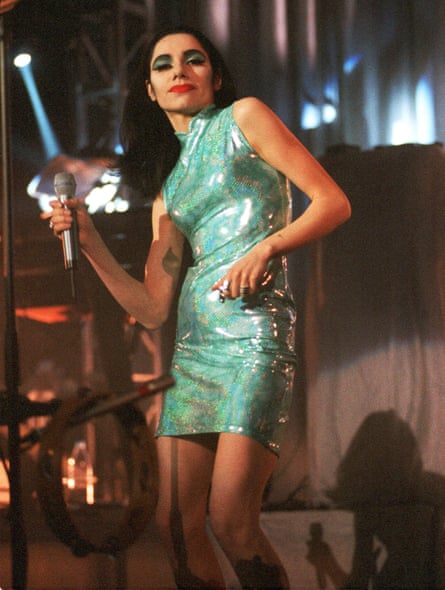
Sometimes they’re right. And this is all fine. Because we can believe that Britpop existed and we can believe it didn’t, all at the same time. Because there definitely were a few months in the mid-1990s when UK indie-pop bubbled up from its alternative, outsider origins to bound its way to actual No 1s and shimmy into front-page mainstream culture. And it was genuinely thrilling, in the move-over-grandad-it’s-our-time-now way of all youth-culture explosions. And there definitely was a time – a final, pre-internet time, music-biz hoorah – when boys in secondhand Crimplene trousers and girls in bovver boots somehow became worshipped rather than sneered at. When U2 had to step aside to let characters as unsettling as Brett Anderson and PJ Harvey and Thom Yorke take centre stage. That all happened.
And so Blur went to Walthamstow dog track to be interviewed and local kids shouted, “I bet your mum cut your hair!” and, “You look like my grandad. He has them glasses!” And Noel and Liam Gallagher argued in an NME interview and the recording of it was turned into a single on Fierce Panda. And Jarvis Cocker appeared on a TV show called Pop Quiz, with Des’ree and Chesney Hawkes.
But that time, at the time, wasn’t called anything. Everyone involved was too busy to give what was going on a name. And even when the term Britpop began to be bandied about, in late 1994, early 1995, by people other than the musicians – “people” meaning journalists – it felt reductive. Surely what was going on was too diverse, too messy, too competitive, changeable and awkward to be categorised. This was because the scene, such as it was, was full of diverse, messy, competitive, changeable, awkward people, who were still quite young and unsure of how they might fit in or what their talent could mean or where it could take them. Were Underworld Britpop? Was Tricky? Or Garbage?
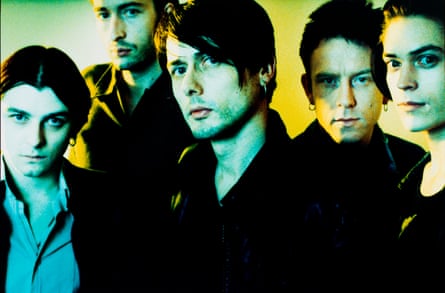
Who used it first? It wasn’t in Stuart Maconie’s 1993 article about exciting new UK bands in Select magazine, which featured Brett from Suede looking foxy on the cover with a union flag behind him. The cover line reads “Yanks go home”, and Maconie’s feature argued that, although Nirvana were a great group, the US rock bands that came in their wake were not, and surely it was time for some fantastic new British talent to get a look in. Aside from Maconie’s overriding argument, there were interviews with Suede, Saint Etienne, the Auteurs, Denim and Pulp. (No Blur, because they’d been in the mag the month before.) It was in an article about Blur in the Face in August 1994, by Cliff Jones, where he wrote: “If punk was the last English revolt into style, its legacy was a re-empowering of Brit pop.” And by the start of 1995, John Harris could dot “Britpop” throughout an NME article entitled “Modern Life Is… Brilliant!” and know that every reader understood what he meant. “Think about the wonderment oozed by Suede and Oasis and Blur and Elastica,” he wrote “and allow yourself one smug thought: what a fantastic time to be young.”
Perhaps it was a feeling, then. A sensation of “this is our time”. Youth culture waves tend to need a name, whether that’s New Romantic or rave or shoegaze or emo or grime, just so people outside that culture can understand a bit about what’s going on.
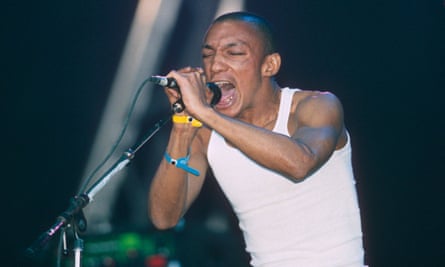
So if Britpop exists and doesn’t, all at once, what does “Britpop” mean now? Well, it’s a search term. Music retailers like categories, as do bookshops, dating apps and Spotify recommendations. And Britpop signifies UK indie-pop music of the mid-90s, in the same way as the late 1960s era of the Beatles and the Stones is called the swinging 60s or early 2000s London UK hip-hop is usually described as grime, or grime kids. It’s a sales shorthand. All good, except that over the years the label seems to have edited the music and the people that were around at that time. They’ve been flattened out, made boring. The Britpop label now appears to mean cheery, plodding, meat-and-potatoes, four-white-guys indie-rock with roots in 60s pop and 70s glam. But the music of that time, and the people who made it, were better than that. More interesting. More thrilling. Weirder.
Let’s decide that the years between that April 1993 “Yanks go home” Select cover and August 1997, when Oasis released Be Here Now, are the years that we are discussing. In that time, a vast array, a fast affray of very different artists and bands such as Elastica, Manic Street Preachers, Chemical Brothers, Garbage, Radiohead, Supergrass, Sleeper, Tricky, Underworld, PJ Harvey, the Prodigy – as well as Oasis, Blur, Pulp and Suede – all blossomed and came to the fore.
In the mid-90s, I was writing for Select and the Face. Select was a monthly music magazine that combined the NME’s in-depth indie music knowledge with Smash Hits’ cheeky attitude and ace posters, and it’s what I think of when I think of Britpop. At Select our music adoration was expansive: we loved the Prodigy as much as we loved Suede, Stereolab as much as the Peej or Blur or Underworld. We loved any band with their own unique idea – their own daft manifesto – as well as their own particular sound and way of dressing; and we loved the fun of pop, the joy of mouthy pop stars and up-and-at-you tunes. No time for tedious worthiness, for “hey man, we make music for ourselves and if anyone else likes it it’s a bonus” rock.
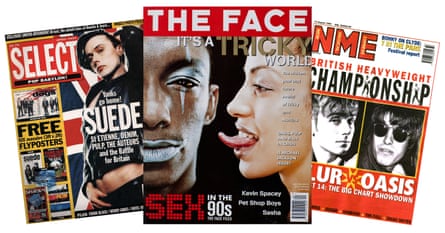
And if we extend out, just a little, from that time, then we can pull in artists and songs that helped create that unusually celebratory mid-90s atmosphere, or who stretched the upbeat feeling on towards the end of the decade. The musicians who ran with the central Britpop idea of making pop tunes while not compromising on invention or identity, who knew what they wanted to do and how they wanted to look while they were doing it, who made odd music, specific to themselves, who somehow ended up winning the hearts of thousands.
The songs are the thing, really. We might like to label them as part of a scene, but the songs always break free. It’s the songs that have lasted, that bring in new fans and fill stadiums with people that weren’t even born when they were released. Songs cut through lives, stretch the years, compress them, make us cry on the top floor of the bus when everything’s OK really, it’s just life, you know, its desperation, its joy. They’re not only about what’s gone. They live in the moment, and because they do, they make us young and old, alone and together, back in the past and completely of now, all at the same time.
Why Underworld’s Born Slippy is a Britpop classic
Miranda Sawyer’s book examines 20 tracks of the era, from Suede’s The Wild Ones to Tricky’s Aftermath and, extracted here, the Trainspotting hit that became a national drinking anthem
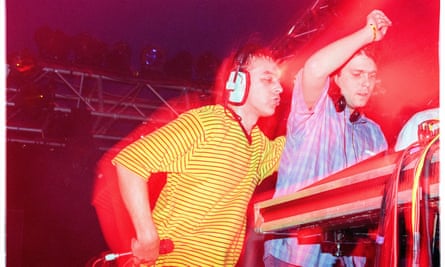
We’ve all had a night out like Underworld’s Born Slippy (or Born Slippy .NUXX, to give it its proper title). Not just a night out dancing to it, but a night like the one the lyrics describe. Unlike many dance tracks of that era, you can’t call Born Slippy a journey. Instead, the words give us a series of snapshots, the kind of shattered memories that return in sweaty, mortifying flashbacks during the daylight hours after a heavy night.
The music sounds like a sunrise, a shimmer, a beautiful awakening, and then it shifts. It starts hurtling, thumping, careering forward, and here come the snapshots… Here’s your night out.
Girls smiling from dark doorways, inviting you into the sex clubs below. Lads roaming in dangerous packs, as you bump about in a drunken fuzz – chatting to randoms, bouncing between tube and pub and tottering along the roads and into other people. And for a while you’re feeling huge and invincible – the evening’s mega and so are you – until your feelings slip a little and you slump into your inner space… Only for you to smash back into real life. Another pint! On we go! Up to the bar, shouting random stuff, more lager, more shouting.
And the music, the kick drums and the chiming chords, sound like the train home, but also your heart pumping when you’re out. There’s a gallop to the beat in the middle. And somewhere, sort of hidden in the mix, there’s another sound. Like the breathing you hear inside your head, a chilly tidal hum.
In Born Slippy, Karl Hyde is describing an early-90s night out in Soho. Though it could be anywhere, really; anywhere that lets you bump about drunk. But for him, it was Soho. Soho was buzzy, then. Previously, it had been, not a wasteland, but a place where it was possible to walk around late on a Wednesday evening and not see anyone. The drinking places were all hidden, often not legit or accessible: either artsy drinking clubs or sex niteries. But in the late 80s and early 90s, small media businesses set themselves up in cheap rooms, mostly above shops. Smash Hits above Boy on Carnaby Street; Heavenly, Junior Boy’s Own, Food record labels all around the corner. Lots of film and TV companies; small clothes stores; independent record shops.
And everyone who worked in those places liked to go out. The pubs filled up; the afterparties started to happen; clubs opened in places such as Gossips and St Moritz. Tomato, a design agency, had its offices above Black Market Records. It was part-owned by Underworld’s Rick Smith and Karl Hyde, and was their base when they came into town from Romford.
The night in Born Slippy was just one of those nights, a random hammering, one of those go to work, then to the pub, then to some dive, then home on the last train, evenings that ended with Hyde banging into the Ship pub and, for some reason, giving comedian Bill Bailey a fiver to get a round. Before Bailey could do the honours, Hyde turned around and scarpered. “Karl was always one for disappearing,” a friend of his told me. “You’d look round and he wouldn’t be there any more.” But Hyde would also make notes, during the evening, just little descriptions of what was happening or records of what was said. The lyrics to Born Slippy were notes he took on that night. There was lager. There was shouting.
Hyde and Rick Smith met in 1981, when they were both working in the kitchen of a Cardiff restaurant. Hyde, from Bewdley in Worcestershire, was studying at a local art college, which had a department called the Third Area that merged art with philosophical ideas. The main one being: art is fine art, meaning visual art, but also music, sound and performance. Smith was doing an electronic and electrical engineering degree. He dropped out when Hyde asked him to join his band, Screen Gemz. “Screen Gemz were the biggest band in Cardiff for a month,” said Smith. “A month later, they weren’t.”
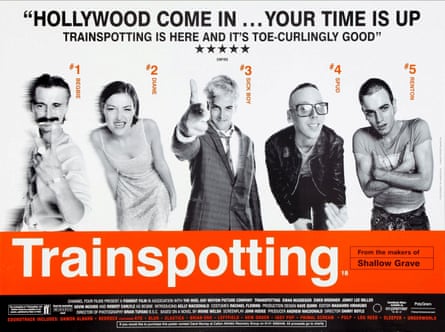
Not to worry: a few years later, Hyde and Smith, along with three others, were in a band with a squiggle for a name, the squiggle usually pronounced Freur. Freur were signed by CBS and had a minor hit in 1983 with the actually-pretty-good Talk Talk-cum-Psychedelic Furs track Doot Doot. It got to No 59. They were big in Italy. But things never really took off, and in 1987, with one member leaving and being replaced, Freur morphed into Underworld. This version of Underworld made two albums, supported the Eurythmics on a US tour and tried, really tried, to make it in the pop world. But to no avail.
Things were bad. Smith only kept going because his wife encouraged him. He decided to stop trying to fit into the pop world and just create music he enjoyed. Which turned out to be a sort of eclectic electronica; improvised, experimental, often beautiful dance music. A friend introduced Smith to another Romford local: Darren Emerson, a 19-year-old city boy turned acid house DJ.
Emerson joined Underworld and introduced Smith and Hyde to the dance scene, playing them house tracks from Chicago and Detroit, taking them out. And once he went to his first rave, Hyde thought: “This is it. This is the best gig I’ve ever been to.” The women weren’t getting hit on. No one was looking at the stage.
In the early 1990s, the people who’d set up outdoor raves, or clubs in disused warehouses, one-off all-nighters in empty film studios, started to bring raving indoors, inside properly designed nightclubs. Cream started in Liverpool in 1992. Parties became so-called legal raves, though many illegal ones continued.
Raving, for many people, was revolutionary. It merged many disparate tribes into one: Glastonbury 1990 felt like that. Dreadlocked Travellers, odd-bod prog-heads, northern scallies (Happy Mondays were playing and a lot of people broke through the gates): everyone wanted a great night out, whether they were taking pills, or just drinking. (Smith and Hyde never took drugs.) So many young people were spending their time dancing all night that the government had to both legislate against it, and provide a legal alternative. The drinks industry lobbied for a change to the licensing laws – they were genuinely worried that no one would ever drink alcohol again – and brought out alcopops, to counter the fact that everyone was drinking water.
Acid house, rave and all their offshoots were a far bigger culture than any indie music, but because dance music didn’t throw up quite as many show-off characters, it was harder for the music papers to write about; though they tried, especially Mixmag and DJ magazine. It was the tracks that mattered, and they were often made by people who deliberately stayed out of the spotlight, didn’t want any attention. They didn’t want to go on Top of the Pops anyway. Underworld were like that. Now they’d found music they loved, everything was fun for them again. They were happy not having their photo taken; releasing music as a response to going to clubs. In 1992, they and others were given a field in Glastonbury called the Experimental Sound Field (which eventually became Lost Vagueness). Underworld DJed for seven hours the first night, and 18 the second. “That,” said Hyde later, “became the blueprint for Underworld.”
And then Trainspotting happened. Trainspotting, the film from Irvine Welsh’s 1993 cult book, directed by Danny Boyle, came out in 1996. It captured a moment. Or, if not a moment, a feeling.
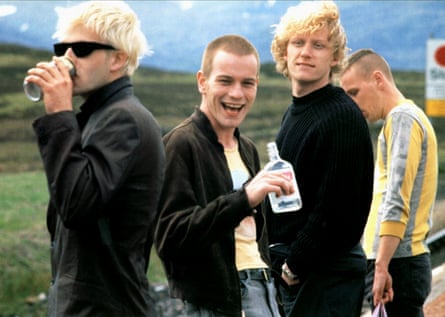
It was about a group of friends – Renton (Ewan McGregor), the charming, lucky, deadbeat anti-hero, Spud (Ewen Bremner), Sick Boy (Johnny Lee Miller), Begbie (Robert Carlyle) and Tommy (Kevin McKidd) – people you felt you already knew. They were unreliable, dishonest, self-seeking, nihilistic. They were all also wildly attractive, defiant and funny. Fizzy with life even while injecting death into their veins.
“I got criticised when the book first came out for making heroin sound fun and glamorous,” says Welsh. “I wasn’t: I was making youth sound fun and glamorous. On one level, Trainspotting is a terrible, miserable experience: they’re fucking themselves up. But they don’t care because they’re young and having fun.”
Trainspotting is about youth, its rebellion and potential, its blindness to consequences, its absolutely pure belief that nothing matters, so who cares anyway. Both Boyle, who was 40 in 1996, and Welsh, who was two years younger, understood that youth was the story’s power. “Born Slippy” is Trainspotting’s final track. It’s playing as Renton walks over London’s Waterloo Bridge, a bag of money slung over his shoulder, its hopeful chords and heart-attack kick drums ringing out as he strides along.
And as we watch, over Born Slippy’s hazy synths and pounding beat, in voiceover, we hear Renton say: “The truth is that I’m a bad person. But that’s going to change. I’m going to change. I’m cleaning up and I’m moving on, going straight and choosing life… I’m going to be just like you.”
It’s the flipside of the defiant mantra that he makes at the start of the film, the one that ended up on every teenager’s wall, the one that reads like a prayer, as well as a curse. You know it. “Choose life. Choose a job. Choose a career. Choose a family. Choose a fucking big television, choose washing machines… Choose your future. Choose life.”
Before Trainspotting, Born Slippy wasn’t a hit, but when it was rereleased after the film, in July 1996, it went to No 2 in the charts. Killing Me Softly by the Fugees beat it to No 1; two weeks later, the Spice Girls’ Wannabe took over the top spot. You wonder what would have happened if it had been called Lager and Shouting.
Born Slippy is a strange track: deceptive, not straightforward. It’s a few things all at once. Underworld were surprised when Boyle said he wanted it in his new film. They’d released it on a single in 1995 that had gone to No 52 and then dropped out of the chart. (Which brings us to the really odd thing about Born Slippy. It’s not actually called Born Slippy. That’s the A-side of the single. It’s Born Slippy .NUXX, the B-side; it’s often called a remix, but it’s actually an entirely different track.)
Somehow, the track is really like Trainspotting. It paints a picture of addiction, but it doesn’t judge. Trainspotting doesn’t promote heroin and Born Slippy doesn’t promote lager and shouting. The music makes it sounds like it’s being positive, and for some people – the fans who jump up and down, waving their cans when they hear it – it genuinely is a celebration of the joys of sinking a few tinnies and behaving like a loon. But it wasn’t written like that. It’s Hyde’s drunken observations. Which means it can be understood in many different ways. Born Slippy is both celebration and commiseration, delight and subsequent regret.
Hyde has said, of those times, that he’d made “a conscious decision to use alcohol in the process of simplifying life of an evening”. When he went out, there was so much information coming at him that he felt overwhelmed. If he’d had a drink, he felt OK, he was able to single things out, offer them up.
But eventually booze, as it can do, brought consequences, and it took over his life for a few years. He gave it up at the end of the 90s. And his feeling about Born Slippy changed. He realised that he was documenting a mind going into spasm, short-circuited by alcohol. He found it hard when people saw his lyrics as a sort of football anthem, a celebration of getting hammered, when to him they were describing a nightmare. He had to get sober to live. “The only reason we ever printed the lyrics to Born Slippy,” he said, “was because it became a drinking anthem, and I was so gutted because it was in fact a cry for help.”
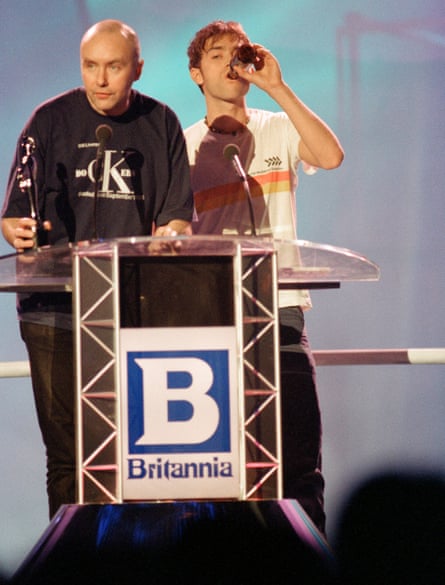
Dance music is more open and spacious than pop music. It allows you to insert your own mind, find your own images, put your own twist to it, more than the stories and specificities of pop. The music does whatever you feel it does. The weird thing is, despite the sense of unity on a dancefloor, it’s not the same for everyone. As you get older, you realise, for some people, that hedonism is hiding an addiction. People topple over, they fall through their rock bottom, they don’t come back.
Though Hyde used to hate people waving cans of lager to the lyrics to Born Slippy, after some years, he understood that people make the lyrics mean what they want. A mantra, a spell, a manifesto. Lager and shouting. Art and pop music made from desperation. Just some of the UK’s greatest exports.
Plus, there’s something to do with the times it was created in, the mixed-up/smashed together/something’s changing era of Britpop that Rick Smith likes. “There was energy firing off all over the place,” he said. “Sometimes things come out of really drab places. There was beauty in debris and deconstruction and rawness. And I think that’s all part of that piece.”
Welsh feels differently. “Britpop was a celebration of British culture, everything you’d seen before all rehashed again, but also like a requiem for British culture,” he says. “You felt like: all this is gonna go, from Teds to ravers and everything in between, it’s all gonna be sold off to the internet, to the global marketplace, and sold back to us in chintzy Instagram influencers. There’s gonna be a fire sale of youth culture. The party’s over.”
-
This is an edited extract from Uncommon People: Britpop and Beyond in 20 Songs by Miranda Sawyer, published by John Murray (£25) on 24 October. To support the Guardian and Observer order your copy at guardianbookshop.com. Delivery charges may apply
-
Underworld’s new album, Strawberry Hotel, is released 25 October on Virgin
Source: theguardian.com
